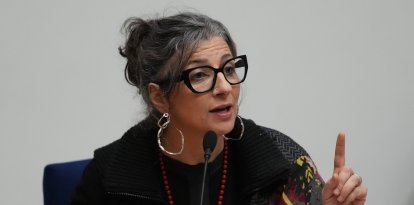Two Trump advisers imprisoned while Garland refuses to release Biden interview audio
Many Americans view Peter Navarro and Steve Bannon as "political prisoners."

Voz Media design
Last week Steve Bannon was sentenced to four months in prison, as was Peter Navarro, who is already in prison. Donald Trump's two former advisers have been sent to prison for contempt of Congress. Over the years, several senior officials have been found in contempt and the Department of Justice has failed to take action, the most notable cases in recent years being those of Attorneys General William Barr and Eric Holder. When it comes to Trump's advisers, the rules seem to be different.
The fact that Navarro has been sent to prison for not appearing before Congress has already upset millions of Americans who view him as a political prisoner. However, the situation became even more complicated last week when Attorney General Merrick Garland was also held in contempt by Congress. Remarkably, the Department of Justice responded by saying that it would take no action against Garland.
The contempt vote against Galand occurred after he refused to provide Congress with the audio of President Joe Biden's interview with Special Counsel Robert Hur. This interview was part of the investigation into Biden's mishandling of classified documents that were found at several of his properties. Hur ultimately did not recommend charging the president, concluding that although Biden improperly moved and kept the documents, as an "elderly man" with a "poor memory," he lacked criminal intent.
Although the Justice Department has already provided Congress with the transcript of the interview, Republicans have insisted that the audio be released. Some do not trust the transcript and believe it could have been edited, others simply want Americans to have access to the hours of conversation in which the president rambled to such an extent that the prosecutor recommended not pressing charges, citing Biden's impaired memory and doubting a jury would find him fit to stand trial.
In other words, the interview that prosecutor Garland does not want to reveal left as one of its main conclusions that Joe Biden is not in a position to appear before a jury, because he does not even remember basic matters. Curiously, according to the Democrats, Biden is capable of being the president of the United States.
After weeks of pressure from Republicans to obtain the interview, the Biden administration said it was invoking executive privilege to withhold its release. Paradoxically, both Bannon and Navarro also sought to exercise their legitimate claims of executive privilege as former presidential advisors but faced a different standard from the DOJ.
Executive privilege was created to guarantee a president's senior advisers that they can advise the president without worrying that those conversations will later be revealed or used against them. The goal is for advisors to be able to do their jobs without being restricted by the thought that they may later be accused. An issue that draws a lot of attention is that although Bannon and Navarro were advisors to a president, Prosecutor Hur was not an advisor to President Biden, nor was the interview in question about any public policy advice. Hur was investigating Biden!
However, many lawyers argue that the concept of executive privilege should not apply to Biden's interview with Hur. Despite this, the White House invoked executive privilege and the Department of Justice did not object. This stance contrasts with the DOJ's approach towards Bannon and Navarro, whose claims of executive privilege were disregarded.
According to a recent letter from the Department of Justice to House Speaker Mike Johnson, the DOJ stated its long-standing position of not prosecuting executive branch officials for failing to disclose information subject to executive privilege. The letter indicates that, for this reason, the Department will not prosecute Attorney General Garland despite him being held in contempt of Congress.
While the U.S. judicial system has had a long history of protecting public servants and protecting them from potential political retaliation by not prosecuting contempt of Congress charges, as was the case of Barr and Holder, the decision to not prosecute Garland would typically not cause major discomfort. However, in recent months the Biden administration's Department of Justice seems to have completely broken that tradition. Not only has it pursued numerous investigations against Trump mere months before the elections, but has even ordered the imprisonment of two of his senior advisors.

























